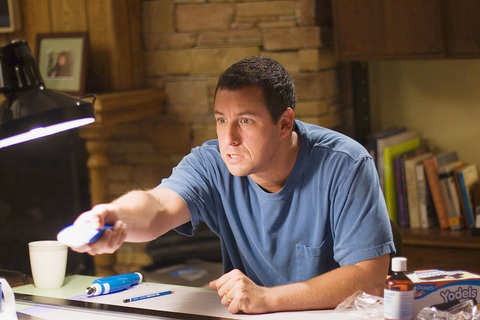Having conquered youngish love in 50 First Dates, Adam Sandler has turned his careless attention to family life with his new film, Click. With any luck this may mean that, after next tackling middle age and retirement, this comic actor, who has made a career out of variations on the modern man-child, might soon be headed toward the great big cinematic beyond, thereby putting an end to his attempts to broach a subject profoundly unsuited to his talents: adulthood.
Sandler's talents are certainly modest, but the success of films like The Waterboy indicates that they are the sort of gifts that connect with moviegoers. In these and other audience favorites, Sandler plays emotionally and psychologically stunted men who, through happenstance and the help of a hot babe, end up lurching toward relative wisdom or at least success. Around the time of the release of Big Daddy, he was quoted as saying: “I like idiot characters. It's fun to play that kind of guy: clueless people who frustrate other people.” Sandler's big trick has been to turn those idiot characters into heroes who invariably have the last mean laugh. Think Revenge of the Nerds, but with a lower IQ.
Click more or less follows the usual template: Sandler stars as Michael Newman, an up-and-coming architect with a pert, pretty wife, Donna (Kate Beckinsale), and two button-cute young children, Ben and Samantha, each of whom is played by three different actors, for reasons that will soon become clear. The story takes off after Michael, while searching for a universal remote control to simplify his chaotic life, wanders into a Bed, Bath and Beyond, where he meets a freaky salesclerk, Morty, with lightning bolts blazing off his head (who else? Christopher Walken). Morty of course understands that what today's harried white-collar family man needs is no ordinary remote, which is how Michael ends up with a device that allows him to hopscotch through time.

PHOTO: SONY
While some people might use a time-traveling device to, say, get the real scoop on weapons of mass destruction in Iraq, Michael uses it to turn the volume down on his dog and his wife, the two being more or less interchangeable irritants, at least story-wise. He also rewinds to high school and to several earlier cringe-worthy incidents involving his parents (Henry Winkler and Julie Kavner, each wearing some grotesque facial prosthetics). In a sop to the film's target audience, he also uses the remote to reduce the speed of a female jogger so he can watch the health-conscious blonde's generously proportioned breasts bounce slowly, slowly, up and down, an effect that would have been impossible if this ambulatory eye candy had been wearing the proper brassiere.
Breasts are big, so to speak, in Click. When Michael fast-forwards to what turns out to be a fairly dark future — it's a wonderful life, not — he does a double take at the similarly bountiful profile of his now-adult daughter (Katie Cassidy) and orders her to put on a sweater, apparently as much for his sake as hers.
Michael arrives at this epiphanic moment after the story takes several abrupt turns into thornier terrain involving roads unwisely taken. Following the lead tendered by the credited screenwriters, Steve Koren and Mark O'Keefe, the director Frank Coraci struggles to push the character toward the kind of age-appropriate complexity lost on Sandler, forgetting that his star only works when, as all those ponderous bosoms suggest, he's unweaned.

April 28 to May 4 During the Japanese colonial era, a city’s “first” high school typically served Japanese students, while Taiwanese attended the “second” high school. Only in Taichung was this reversed. That’s because when Taichung First High School opened its doors on May 1, 1915 to serve Taiwanese students who were previously barred from secondary education, it was the only high school in town. Former principal Hideo Azukisawa threatened to quit when the government in 1922 attempted to transfer the “first” designation to a new local high school for Japanese students, leading to this unusual situation. Prior to the Taichung First

The Ministry of Education last month proposed a nationwide ban on mobile devices in schools, aiming to curb concerns over student phone addiction. Under the revised regulation, which will take effect in August, teachers and schools will be required to collect mobile devices — including phones, laptops and wearables devices — for safekeeping during school hours, unless they are being used for educational purposes. For Chang Fong-ching (張鳳琴), the ban will have a positive impact. “It’s a good move,” says the professor in the department of

On April 17, Chinese Nationalist Party (KMT) Chairman Eric Chu (朱立倫) launched a bold campaign to revive and revitalize the KMT base by calling for an impromptu rally at the Taipei prosecutor’s offices to protest recent arrests of KMT recall campaigners over allegations of forgery and fraud involving signatures of dead voters. The protest had no time to apply for permits and was illegal, but that played into the sense of opposition grievance at alleged weaponization of the judiciary by the Democratic Progressive Party (DPP) to “annihilate” the opposition parties. Blamed for faltering recall campaigns and faced with a KMT chair

Article 2 of the Additional Articles of the Constitution of the Republic of China (中華民國憲法增修條文) stipulates that upon a vote of no confidence in the premier, the president can dissolve the legislature within 10 days. If the legislature is dissolved, a new legislative election must be held within 60 days, and the legislators’ terms will then be reckoned from that election. Two weeks ago Taipei Mayor Chiang Wan-an (蔣萬安) of the Chinese Nationalist Party (KMT) proposed that the legislature hold a vote of no confidence in the premier and dare the president to dissolve the legislature. The legislature is currently controlled